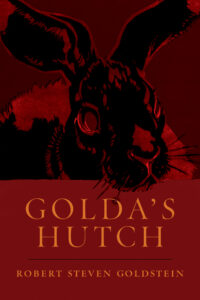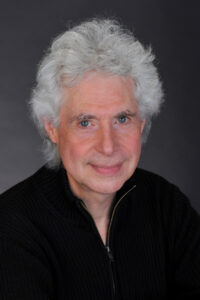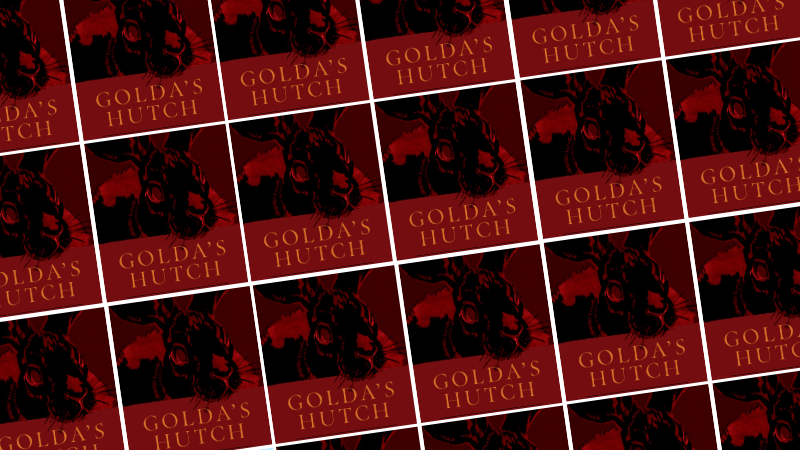 SAN FRANCISCO, CA – How well do you really know the people you encounter every day? Award-winning author Robert Steven Goldstein’s gripping psychological thriller “Golda’s Hutch” (March 11, 2025, Deft Heft Books) explores what we hide from the world versus what we reveal, the lengths we’ll go to keep our secrets buried—and the unpredictable steps we take when our innermost lives are threatened.
SAN FRANCISCO, CA – How well do you really know the people you encounter every day? Award-winning author Robert Steven Goldstein’s gripping psychological thriller “Golda’s Hutch” (March 11, 2025, Deft Heft Books) explores what we hide from the world versus what we reveal, the lengths we’ll go to keep our secrets buried—and the unpredictable steps we take when our innermost lives are threatened.
Craig Schumacher is not your typical executive. With a gentle spirit and a morning ritual that includes serene meditation alongside his cherished rabbit, Golda, Craig values connection over competition. Yet, beneath his calm, polished exterior lies a secret he’s worked hard to keep hidden—one that could change everything.
Enter Byron Dorn—Craig’s employee and chaos incarnate. Crude, impulsive, and driven by envy, Byron is elated when he and his wife stumble upon information that he believes could unravel Craig’s life. But when Byron ropes another couple into his schemes, things become a lot more complicated.
Because Craig isn’t the only one with a secret. And as the stakes rise, everyone will have to decide what they’re willing to sacrifice to get what they want—and when they’re willing to walk away.
Set against the dynamic backdrop of San Francisco, this gripping psychological novel weaves a complex tapestry of deception, envy, desire, politics, and power.
Golda’s Hutch
Robert Steven Goldstein
March 11, 2025 | Deft Heft Books
Hardcover | 978-0-98881165-2 | $27.99
Paperback | 978-0-98881163-8 | $15.99
Ebook | 978-0-98881164-5 | $7.99
Literary Fiction
More about Robert Steven Goldstein
 Robert is the author of five novels. His first, The Swami Deheftner, about problems that ensue when ancient magic and mysticism manifest in the twenty-first century, developed a small cult following in India. His second novel, Enemy Queen, a sexual comedy of manners set in a North Carolina college town, was a finalist in the category of cross genre fiction for the International Book Awards. Robert’s third novel, Cat’s Whisker, probes the perceived rift between science and spirituality; it was longlisted for the prestigious Chanticleer International 2021 SOMERSET Book Award for Literary and Contemporary Fiction. His fourth novel, Will’s Surreal Period, about the peripatetic machinations of a dysfunctional family, was longlisted for the Chanticleer International 2022 SOMERSET Book Award for Literary and Contemporary Fiction.
Robert is the author of five novels. His first, The Swami Deheftner, about problems that ensue when ancient magic and mysticism manifest in the twenty-first century, developed a small cult following in India. His second novel, Enemy Queen, a sexual comedy of manners set in a North Carolina college town, was a finalist in the category of cross genre fiction for the International Book Awards. Robert’s third novel, Cat’s Whisker, probes the perceived rift between science and spirituality; it was longlisted for the prestigious Chanticleer International 2021 SOMERSET Book Award for Literary and Contemporary Fiction. His fourth novel, Will’s Surreal Period, about the peripatetic machinations of a dysfunctional family, was longlisted for the Chanticleer International 2022 SOMERSET Book Award for Literary and Contemporary Fiction.
Golda’s Hutch is Robert’s fifth novel. He and his wife Sandy live in San Francisco; over their thirty-six years together, they’ve shared their home with an array of dogs, cats, rabbits, turtles, and parrots, each of whom has displayed a unique personality, startling intelligence, and a profound capacity for love. Robert has practiced yoga, meditation, and vegetarianism for over fifty years. Find out more about him at his website.
In an interview, Robert can discuss:
- The duality of human nature and how hidden truths can influence relationships
- How he explores in his writing the lengths to which people will go to achieve their personal desires
- Morals and ethics in the business world informed by his long career as a corporate executive
- The examination of animal intelligence and ties to spirituality through Golda, and her representation of larger themes
- The categorization of BDSM as a sexual orientation
- Less “traditional” Eastern approaches to spirituality including yoga, meditation, and vegetarianism
An Interview with Robert Steven Goldstein
1. Your novels are primarily categorized as literary fiction, but you explore a wide variety of topics. Why do you think your genre is the best fit to explore the complexities of life?
The category “literary fiction” can be tricky to define, but most readers probably agree that literary fiction tends to be character driven, with evocative and poetic language, and an approach to storytelling where thoughts and ideas are equally as important as action. But, although much literary fiction drills down into the depths of seemingly ordinary people, I don’t think it necessarily needs to be that way. I am driven to write novels whose characters are often dysfunctional, sexually divergent, interested in a wide variety of ideas, and prone to seek spiritual fulfillment through paths incongruent with traditional Western religions. I believe that if good fiction can depict characters of this sort, who are nonetheless sympathetic and endearing, it can promote tolerance and compassion among those exposed to such writing.
2. Why do you think so many people in society still largely view BDSM as taboo?
In some ways, this really is puzzling. People who identify as LGBT+ are now fully accepted in most socially progressive circles. Yet, people expressing a sexual orientation involving BDSM are often not at all accepted in those same circles. Perhaps this reflects the human tendency to fear anything “other”—anything distinctly different from what we are personally familiar with. Granted—it took a long time for many heterosexual individuals to get past the fact that gay people are involved with partners of the same gender—but once they were able to accept that, they found it easy to identify with a gay couple’s desire to love, marry, be faithful to each other, and raise children. For many people, BDSM still seems different and more foreign. It adds the element of power to sex, and involves psychodrama, pain, and bondage—these are elements that most people associate with criminal and non-consensual activity—and find it hard to accept that for some people, it’s their inherent way of expressing sexual love, and is safe and fully consensual in the way it’s embraced by those in the BDSM community.
3. How do spiritual practices and exploration of faith play into the themes of Golda’s Hutch?
Craig, the main character in the novel, is a deeply spiritual man, but is not religious in the traditional Western sense. His spiritual practice is built upon four components: yoga, meditation, vegetarianism, and a code of behavior that comprises compassion and harmlessness, a concept known to Hindus, Buddhists, and Jains as Ahimsa. Things get really interesting when Craig—a vice president in a company where attitudes toward staff and working conditions are becoming increasingly Machiavellian—presses his spiritual beliefs and his practice of compassion into the mix of management and productivity—engendering loyal and high-performing work teams—but infuriating his fellow executives.
4. How do you think sex scenes between characters help uncover their personalities?
Not all literary fiction includes sex scenes—and some readers may even think that such scenes preclude a work from being characterized as literary fiction. I disagree, but it’s important that such scenes are not presented merely as titillating erotica—but rather, that they add to the reader’s understanding of the characters involved. And this really should be a fairly straightforward concept. Good fiction shows rather than tells. So, if an author is offering readers an in-depth glimpse into the personalities of the characters by showing exactly how they go about doing things—then, certainly, sex is something that most people do, and the way they do it can be telling with respect to who they really are.
5. In a world where everyone wears a ‘mask,’ what do you think it means to be truly authentic, and how far do you think people are willing to go to uncover hidden truths within themselves and others?
We all have the “self” we want to present to the world—the mask or persona. For most of us, that represents the person we truly want to be—fair, kind, wise, and loving—but strong and successful. When things go our way, it’s not that hard to live up to our self-set expectations. But stress, and especially the pressure to perform and produce, can begin to eat away at those high aspirations, and force us to make compromises. Four of the main characters in Golda’s Hutch hold positions of responsibility in a corporation, and feel squeezed in precisely that manner. But the way each responds is quite different, and quite telling as to the kind of person they are at their core.
Download press kit and photos

A former award-winning journalist with national exposure, Marissa now oversees the day-to-day operation of the Books Forward author branding and book marketing firm, along with our indie publishing support sister company Books Fluent.
Born and bred in Louisiana, currently living in New Orleans, she has lived and developed a strong base for our company and authors in Chicago and Nashville. Her journalism work has appeared in USA Today, National Geographic and other major publications. She is now interviewed by media on best practices for book marketing.


